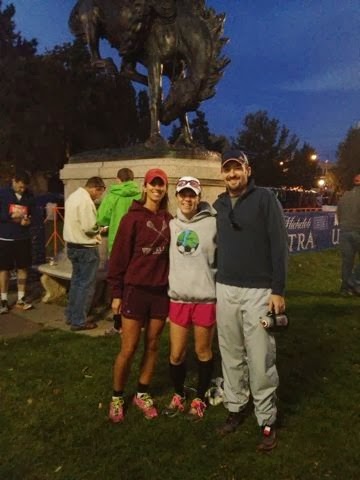If a race is going to be a success, it must have three things: awesome volunteers, plenty of water and food, and lots of port-a-potties. While I can't thank volunteers enough for their time setting up and tearing down races, handing out water and energy beverages to clumsy runners, and helping us to stay on course, most runners agree, ample port-a-potties are essential.
This got me thinking. How much do races cost? Why are some races well endowed with portable poop catchers, while others leave us long lines and no where to turn minutes before the start?
Here's the breakdown:
If a race has 10,000 participants (this doesn't include our awesome volunteers), and you wanted one portable toilet for every 100 runners, you would need 100 port-a-potties. After calling 3 different companies, I found the cheaper toilet rentals are about $35 (because you are renting in bulk). This includes installation and take down. Some companies offer more perks and the prices can change wildly based on how many toilets are rented, and for how many days they are assembled. This leaves the race director with a cost of $3,500. This isn't enough, however; 100 toilets for 10,000 people will inevitably leave long lines and fecal stains on multiple runners' shorts.
 |
| Okay, I probably went too far on this one... Gross. |
$500,000 - $7,500 = $492,500 left to spend on finisher's medals and t-shirts, food, water, energy drinks, police officers, registration, website design, etc...
At CustomInk.com, you can purchase 10,000 tempo performance race shirts with logos for $148,200.
$492,500 - $148,200 = $344,300.
Most races boast of big sponsors who donate food, volunteers, beverages, and money. Non of my figures include money collected outside of registration fees, and they are obviously rough estimates. Directing a race is not only a lot of work, but a huge financial undertaking. That being said, I've run in races with lots of food, water, awesome volunteers, beautiful medals, nice shirts, and most of all infinite portable restrooms. I've also run races that had an equal number of participants and yet there wasn't water available just 2 miles into the race. The lines were so long for the port-o-john, that I found myself squeezing back urine for the next couple hours as I tried to focus on running instead of peeing myself. Race directors are not pocketing endless gobs of cash, so what makes the difference between a quality race and an utter failure?
What do you think are the most important factors in a race?
What races do you enjoy the most due to their great organizing?
How long is too wait to poop/pee before a race?
~Roadburner




























